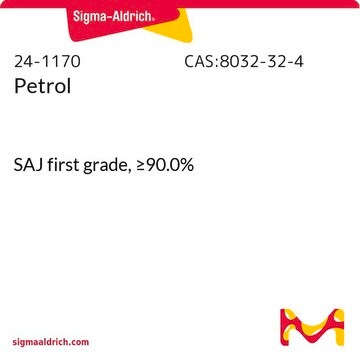24-1390
Fenol
JIS special grade, ≥99.0%
Sinónimos:
Hidroxibenceno
About This Item
Productos recomendados
grade
JIS special grade
vapor density
3.24 (vs air)
vapor pressure
0.09 psi ( 55 °C)
0.36 mmHg ( 20 °C)
assay
≥99.0%
form
solid
autoignition temp.
1319 °F
expl. lim.
8.6 %
availability
available only in Japan
pH
~5 (20 °C, 50 g/L)
bp
182 °C (lit.)
mp
40-42 °C (lit.)
density
1.071 g/mL at 25 °C (lit.)
SMILES string
Oc1ccccc1
InChI
1S/C6H6O/c7-6-4-2-1-3-5-6/h1-5,7H
InChI key
ISWSIDIOOBJBQZ-UHFFFAOYSA-N
¿Está buscando productos similares? Visita Guía de comparación de productos
signalword
Danger
Hazard Classifications
Acute Tox. 3 Dermal - Acute Tox. 3 Inhalation - Acute Tox. 3 Oral - Aquatic Chronic 2 - Eye Dam. 1 - Muta. 2 - Skin Corr. 1B - STOT RE 2
target_organs
Nervous system,Kidney,Liver,Skin
Storage Class
6.1A - Combustible acute toxic Cat. 1 and 2 / very toxic hazardous materials
wgk_germany
WGK 2
flash_point_f
174.2 °F - closed cup
flash_point_c
79.0 °C - closed cup
Certificados de análisis (COA)
Busque Certificados de análisis (COA) introduciendo el número de lote del producto. Los números de lote se encuentran en la etiqueta del producto después de las palabras «Lot» o «Batch»
¿Ya tiene este producto?
Encuentre la documentación para los productos que ha comprado recientemente en la Biblioteca de documentos.
Nuestro equipo de científicos tiene experiencia en todas las áreas de investigación: Ciencias de la vida, Ciencia de los materiales, Síntesis química, Cromatografía, Analítica y muchas otras.
Póngase en contacto con el Servicio técnico











